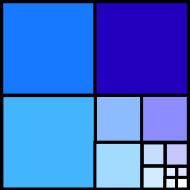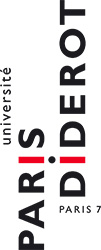
| Aspects dynamiques de la numérationDynamical aspects of numerationDecember 4-6, 2006, LIAFA, Paris |


|

| Aspects dynamiques de la numérationDynamical aspects of numerationDecember 4-6, 2006, LIAFA, Paris |


|
Le thème de ces journées est la numération sous toutes
ses formes, avec un éclairage particulier sur le point de vue dynamique.
Les journées sont soutenues par le
GDR Informatique
Mathématique du
CNRS et le
LIAFA.
The topics are numeration systems of any kind, with a spotlight on the
dynamical viewpoint.
This workshop is supported by the
GDR Informatique
Mathématique of the
CNRS and the
LIAFA.
The workshop took place at Chevaleret (175 rue du Chevaleret, 75013 Paris), room 1C18 (first floor).
| 10:00 - 10:45 | arrival of the participants, coffee at the LIAFA, 6th floor, tower A (talks are on the 1st floor!) | |
| 10:45 - 11:30 | Boris Adamczewski | Around a problem of Mahler and Mendès France |
| 11:45 - 12:30 | Paola Loreti | Greedy and unique expansions |
| 12:30 - 14:00 | lunch | |
| 14:00 - 14:45 | Vilmos Komornik | On the topological structure of univoque sets |
| 14:45 - 15:30 | Martijn de Vries | Unique expansions of real numbers |
| 15:30 - 16:15 | coffee break | |
| 16:15 - 17:00 | Christiane Frougny | Univoque Pisot numbers |
| 17:00 - 17:45 | Nikita Sidorov | Expansions of real numbers in non-integer bases |
| 20:00 | conference dinner |
| 9:30 - 10:15 | Guy Barat | Fibred numeration systems |
| 10:15 - 10:45 | coffee break | |
| 10:45 - 11:30 | Valérie Berthé | Homoclinic points and central tiles |
| 11:30 - 12:15 | Anne Siegel | A better understanding of non unit beta-numeration thanks to the boundary of p-adic Rauzy fractals |
| 12:15 - 14:00 | lunch | |
| 14:00 - 14:45 | Jean-Paul Allouche | Extremal properties of (epi)sturmian sequences and applications |
| 14:45 - 15:30 | Charlene Kalle | Random beta-expansions with deleted digits |
| 15:30 - 16:15 | coffee break | |
| 16:15 - 17:00 | Horst Brunotte | Planar rotation sequences and domain exchange |
| 17:00 - 17:45 | Jean-Louis Verger-Gaugry | Dichotomy of Perron numbers, beta-conjugates and a fractal |
| 9:30 - 10:15 | Jacques Sakarovitch | Some results and questions on rational base number systems |
| 10:15 - 10:45 | coffee break | |
| 10:45 - 11:30 | Michel Rigo | A Tribonacci game |
| 11:30 - 12:15 | Anna Chiara Lai | Ergodic properties of greedy expansions |
| 12:15 - 14:00 | lunch | |
| 14:00 - 17:00 | discussion, open problems, ... |
Paola Loreti: Greedy and unique expansions
Vilmos Komornik: On the topological structure of univoque sets
Martijn de Vries: Unique expansions of real numbers
For each real number q > 1 we consider the set U_q of real numbers x having a unique expansion in base q of the form x = \sum_{i=1}^{\infty} c_i q^{-i} with coefficients 0 \le c_i < q. Glendinning and Sidorov proved in 2001 that U_q is countable if 1 < q < q', where q' is the so called "Komornik-Loreti constant" and U_q is a set of positive Hausdorff dimension if q' < q < 2. In this talk we consider the topological structure of U_q for each q > 1. In particular we determine those values of q for which U_q is closed or even a Cantor set. We also determine those values q > 1 for which the set of unique expansions in base q is a subshift of finite type. The talk is based on joint work with Vilmos Komornik.
Christiane Frougny: Univoque Pisot numbers (joint work with Jean-Paul Allouche and Kevin Hare)
We study Pisot numbers \beta, 1 < \beta < 2, which are univoque, i.e., such that there exists only one expansion of 1 as 1 = \sum_{n=1}^{\infty} s_n \beta^{-n}, with s_n = 0 or 1. We prove in particular that there exists a smallest univoque Pisot number, which has degree 14. Furthermore we give the smallest limit point of the set of univoque Pisot numbers. We also prove that 2 is a limit point of univoque Pisot numbers.
Nikita Sidorov: Expansions of real numbers in non-integer bases
My talk is going to be devoted to expansions in base q in (1,2) with "digits"
0,1.
As is well known, if q is less than the golden ratio, then each x in (0,1) has
a continuum of such expansions.
On the other hand, if q is strictly between the golden ratio and 2, this is no
longer the case - and moreover, there exist points x with a unique q-expansion.
I will show that there exists a constant such that each x has either a
unique q-expansion or a continuum of q-expansions provided q is between the
golden ratio and this constant.
In the opposite direction, I will prove that for each natural
m > 2 there exists an interval of q sufficiently close to 2 such
that for each q in this interval there exist x having any prescribed number k
of q-expansions with k < m.
Various open problems and conjectures will be discussed as well.
Guy Barat: Fibred numeration systems
A general framework for numeration originated in the notion of fibred system due to Schweiger is introduced. Notions of representation and expansion are discussed. A large part of the talk consists in looking at classical examples, to see how they fit in the definitions. In particular, q-adic expansions of integers and real numbers, beta-expansions, continued fractions, Dumont-Thomas numeration will be mentioned.
Valérie Berthé: Homoclinic points and central tiles
The aim of this lecture is to survey the connections between geometric representations of beta-shifts as central tiles, introduced by Thurston and studied by Akiyama, and finite-to-one covers of hyperbolic toral automorphisms, such as discussed, e.g., by Vershik, Sidorov or Schmidt. We will focus on the group of fundamental homoclinic points in the Pisot case.
Anne Siegel: A better understanding of non unit beta-numeration thanks to the boundary of p-adic Rauzy fractals
Jean-Paul Allouche:
Extremal properties of (epi)sturmian squences and applications
Abstract
Charlene Kalle: Random beta-expansions with deleted digits
Horst Brunotte:
Planar rotation sequences and domain exchange
Abstract
Jean-Louis Verger-Gaugry: Dichotomy of Perron numbers, beta-conjugates and a fractal
We investigate the geometry of the Galois conjugates and beta-conjugates (for which we give a general definition) of a Perron number > 1, namely the geometry of the zeros of the power series associated with the Rényi beta-expansion of unity. From Szegő's Theorem, we study the dichotomy problem: whether it is a rational fraction or admits the unit circle as natural boundary. We study a fractal, of Odlyzko-Poonen type, associated with all Perron numbers and their beta-shifts. We prove that the number of beta-conjugates of a Perron number may be infinite in some cases relatively to the second case of the dichotomy, owing to some suitable Hadamard type gap theorems. We investigate the interplay between the classes of algebraic numbers, Perron numbers and this dichotomy.
Jacques Sakarovitch: Some results and questions on rational base number systems
Michel Rigo: A Tribonacci game
We define a take-away two-players game played on three piles of tokens (similar in essence to the well-known game of nim or to the Wythoff's game). We show that this game has a winning strategy given by the Tribonacci word. Moreover, thanks to the use of the Tribonacci numeration system, this strategy can be obtained in polynomial time. This joint work with Eric Duchene gives therefore some connexions between combinatorics on words, numeration systems and combinatorial game theory.
Anna Chiara Lai:
Ergodic properties of greedy expansions
Abstract
Last modified: December 6, 2006